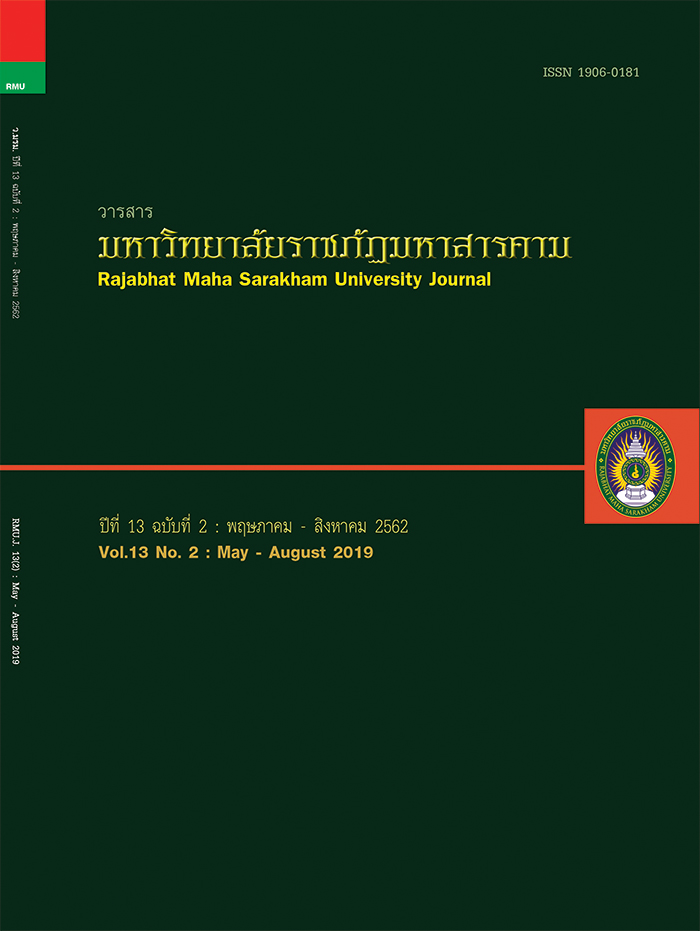การวิเคราะห์องค์ประกอบเชิงยืนยันขององค์ประกอบประสบการณ์ในเมตาคอกนิชัน ด้านการวางแผน ด้านการกำกับติดตาม และด้านการประเมิน ของนักศึกษาระดับปริญญาตรี
Main Article Content
บทคัดย่อ
การวิจัยครั้งนี้มีวัตถุประสงค์เพื่อตรวจสอบโมเดลการวัดประสบการณ์ในเมตาคอกนิชันด้านการวางแผน ด้านการกำกับติดตาม และด้านการประเมินของนักศึกษาระดับปริญญาตรีกับข้อมูลเชิงประจักษ์กลุ่มตัวอย่างเป็นนักศึกษาระดับปริญญาตรีชั้นปีที่ 1 มหาวิทยาลัยเทคโนโลยีราชมงคลในเขตกรุงเทพมหานคร จำนวน 500 คน ซึ่งได้มาโดยวิธีการสุ่มแบบแบ่งชั้น เครื่องมือที่ใช้ในการวิจัยเป็นแบบวัดประสบการณ์ในเมตาคอกนิชัน มีลักษณะเป็นแบบวัดเชิงสถานการณ์ มีจำนวน 3 ตัวเลือก มีค่าความเชื่อมั่นเท่ากับ 0.84 สถิติที่ใช้ในการวิเคราะห์ข้อมูล คือ การวิเคราะห์องค์ประกอบเชิงยืนยัน ผลการวิจัยพบว่าโมเดลการวัดประสบการณ์ในเมตาคอกนิชันด้านการวางแผน ด้านการกำกับติดตาม และด้านการประเมินของนักศึกษาระดับปริญญาตรีกับมีความสอดคล้องกลมกลืนกับข้อมูลเชิงประจักษ์คือ ประสบการณ์ในเมตาคอกนิชันประกอบด้วย 3 องค์ประกอบ คือ การวางแผน การกำกับติดตาม และการประเมิน โดยด้านการวางแผนประกอบด้วย 3 องค์ประกอบ ได้แก่ 1) การคิดเป้าหมายในการทำงาน 2) การคิดวิธีทำงาน และ 3) การคิดคาดคะเนปัญหาในการทำงาน ด้านการกำกับติดตามประกอบด้วย 4 องค์ประกอบ ได้แก่ 1) การคิดกำกับตนเองในการทำงาน 2) การคิดกำกับเป้าหมายในการทำงาน 3) การคิดกำกับวิธีทำงาน และ 4) การคิดกำกับการคาดคะเนปัญหาในการทำงาน และด้านการประเมินประกอบด้วย 4 องค์ประกอบ ได้แก่ 1) การประเมินการคิดเป้าหมายในการทำงาน 2) การประเมินการคิดวิธีทำงาน 3) การประเมินการคิดคาดคะเนปัญหาในการทำงาน 4) การประเมินการคิดกำกับตนเองในการทำงาน โดยมีค่าความสอดคล้องกลมกลืนกับข้อมูลเชิงประจักษ์ซึ่งสามารถยืนยันองค์ประกอบประสบการณ์ในเมตาคอกนิชันด้านการวางแผน ด้านการกำกับติดตาม และด้านการประเมินของนักศึกษาระดับปริญญาตรีได้
Article Details
1. บทความที่ลงตีพิมพ์ทุกเรื่องได้รับการตรวจทางวิชาการโดยผู้ประเมินอิสระ ผู้ทรงคุณวุฒิ (Peer Review) สาขาที่เกี่ยวข้อง อย่างน้อย 3 ท่าน ในรูปแบบ Double blind review
2. ข้อคิดเห็นใด ๆ ของบทความที่ลงตีพิมพ์ในวารสารมหาวิทยาลัยราชภัฏมหาสารคาม นี้เป็นของผู้เขียน คณะผู้จัดทำวารสารไม่จำเป็นต้องเห็นด้วย
3. กองบรรณาธิการวารสารมหาวิทยาลัยราชภัฏมหาสารคาม ไม่สงวนสิทธิ์การคัดลอกแต่ให้อ้างอิงแสดงที่มา
เอกสารอ้างอิง
Khanat Thattong. (2011). Teach Thinking : Learning Management for Thinking Development.Bangkok : Phetkasem Printing.
Thitsana Kemmanee. ; et al. (2001). Thinking Knowledge. Bangkok : The Master Group Mangement Pub Co.,Ltd.
Pasana Chularut. (2013). Me tacognitive with steep Learning. Education Journal, 14(1), 1-17.
Pimpan Dechakub. (2001). Metacognition : Thinking Knowledge. Bangkok : The Master Group Mangement Pub Co.,Ltd.
Flavell, John. H. (1976). Metacognitive aspects of problem solving. In L.R. Resnick (Ed.), The nature of intelligence. Hillsdale, NJ : LawrenceErlbaum.
Flavell, John. H. (1979). Metacognition and Cognitive Monitoring : A New Area of Cognitive-Developmental Inquiry. American Psychologist,34, 906-911.
Flavell, John. H. (1985). Cognitive development. Englewood Cliffs, New Jersey : Prentice-Hall.
Erskine,L. Dana. (2010). Effect of Prompted Reflection and Metacognitive Skill Instruction on University Freshmen’s use of Metacognition.Department of Instructional Psychology andTechnology. Brigham Young University : United state of America.
Keleher, P.; & Chan L. (2003). Methods and strategies in exceptional children training and teaching. translated by Farhad Maher, Tehran : Ghamos publication.
Majed Mohammad. (2012). The Levels of Creative Thinking and Metacognitive Thinking Skills of Intermediate School in Jordan: Survey Study. Journal of Canadian Social science, 8(4), 52-61.
Warawan Chantharanuwong. ; &Sintoovongse, Kingfa. (2007). Students’ MetacognitiveStrategies in Science Through the use TRIP RIP MODEL.2007 ACSA Biennial Conference. (1-10) Melbourne Australia; Curriculum Centre Stage : Inclusivity,Creativityand Diversity.
Beyer, B.K. (1987). Practical Strategies for the Teaching of Thinking. Boston : Allyn and Bacon.
Robert Fisher.(1998). Thinking about Thinking : De veloping Metacognition on Children. Early Child Development and Care, 141(1), 1-15.
Ahmet OguzAkturk et al. (2011). Literature Review on Metacognition and its Measurement. Procedia Social and Behavioral Sciences, 15, 3731-3736.
Marcel V.J. Veenman,; & Jan.J. Elshout, (1999). Change in the relation between cognitive and metacognitive skills during the acquisition of expertise. European Journal of Psychology of Education, 14 (4), 509-523.


